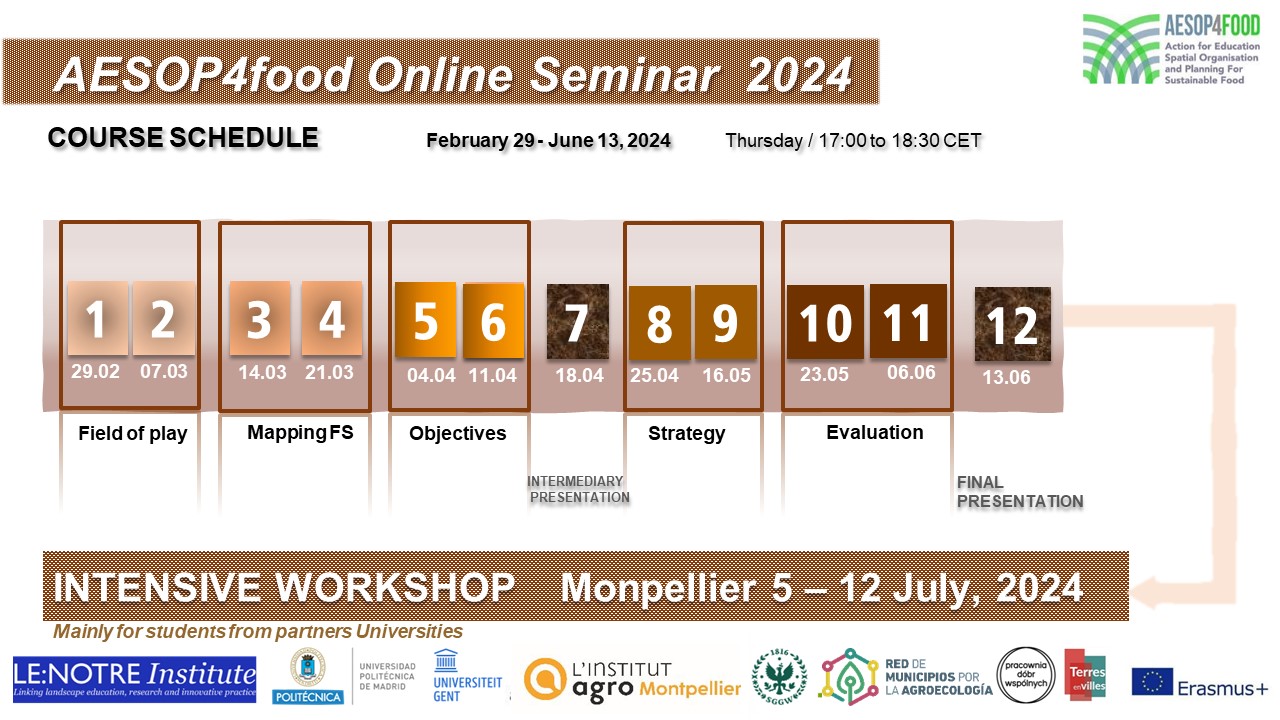Difference between revisions of "AESOP4Food seminar 2024"
| Line 27: | Line 27: | ||
# Lectures and Discussions: Attend insightful lectures and engage in stimulating discussions to expand your knowledge. | # Lectures and Discussions: Attend insightful lectures and engage in stimulating discussions to expand your knowledge. | ||
# A[[Assignments_2024|ssignments (5 ECTS):]] Dive deeper into sustainable food planning by working on practical assignments. Collaborate with small teams focused on Living Labs or projects, benefit from additional tutoring and feedback sessions, and present your results in intermediary sessions. | # A[[Assignments_2024|ssignments (5 ECTS):]] Dive deeper into sustainable food planning by working on practical assignments. Collaborate with small teams focused on Living Labs or projects, benefit from additional tutoring and feedback sessions, and present your results in intermediary sessions. | ||
=Phases and sessions of the course= | |||
Here you will find the presentations and recordings after each session. Those of the previous seminar in 2023 can be found here. | |||
Revision as of 12:25, 20 February 2024
A Transdisciplinary and Participatory Approach to Food System Resilience Planning
Discover the future of sustainable food planning with the AESOP4FOOD Erasmus+ program in 2024 an engaging online open course that's designed to empower individuals from diverse backgrounds, fostering a transdisciplinary and participatory learning experience.
Registration is now closed
All applicants who have registered are accepted. Students of partner schools, of the Tartu, and the Bucharest living lab can address themselves for additional registration to their university contact person.
Content and schedule
Key concepts: Agroecological Urbanism, Regional Agroecological Food Systems, Multi-level Governance, Food Justice, and Democracy.
Join us on Thursdays from 17:00 CET for 10 sessions with 2 presentations for assignments.
International Collaboration: Embrace the opportunity to collaborate with international participants, each bringing their unique background and expertise from planning disciplines, agronomy, environmental sciences, and related fields.
Transdisciplinary Approach: Explore the theoretical foundations, case studies, and project presentations and engage in transdisciplinary learning, facilitated by Participatory Action Learning Research and Action Learning Research (PALAR).
Flexible: Learners, teachers, and teams can integrate this course into their own studio, project work or capacity building while formulating their own assignments. This approach is supported by a series of Living Labs focusing on food resilience.
Forms of Participation
- Lectures and Discussions: Attend insightful lectures and engage in stimulating discussions to expand your knowledge.
- Assignments (5 ECTS): Dive deeper into sustainable food planning by working on practical assignments. Collaborate with small teams focused on Living Labs or projects, benefit from additional tutoring and feedback sessions, and present your results in intermediary sessions.
Phases and sessions of the course
Here you will find the presentations and recordings after each session. Those of the previous seminar in 2023 can be found here.
